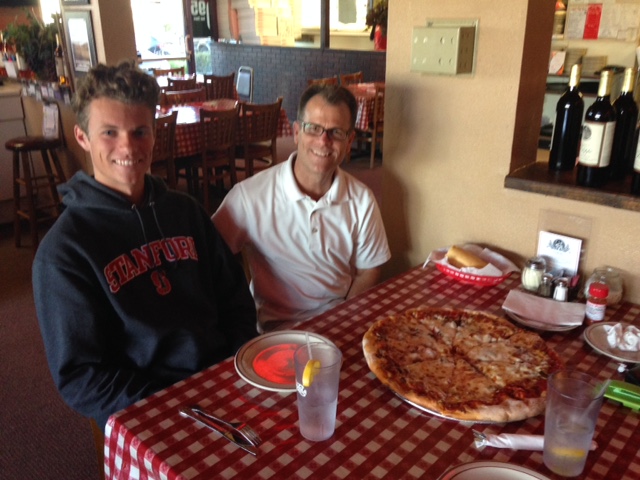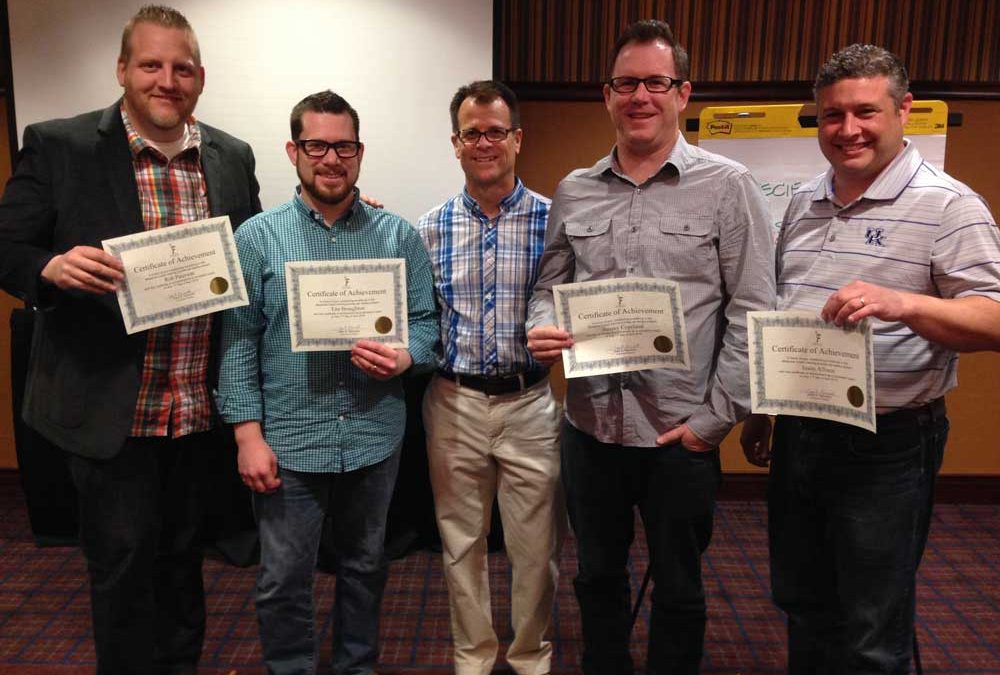I am entering the FB community and the 21st. Century. In May I will be traveling to India & Turkey to conduct coach training workshops. Please “Friend me” on Facebook to receive updates along the way.
Have a wonderful week!

Celebration is an underutilized resource in most coach relationships. What I mean is, when a leader meets a milestone, accomplishes something extraordinary or overcomes a barrier – it is easy to miss the opportunity to celebrate. Celebration comes in many forms, however, what I have learned is that it is not necessarily the method of celebration that matters but rather the heart behind such recognition. In other words, it must be MEANINGFUL! Let me share a story.
As you might imagine from the photo above, this month I celebrated my son’s Joel recent college decision. One of our favorite forms of celebration is an early Friday afternoon pizza at our favorite restaurant. This is not unusual for us.
For the last couple of years I’ve been taking Joel to pizza about once a month. These are special times for us to check-in, discuss issues of the heart, and to explore future direction. Of course, I can’t help myself and these conversations morph into coach-like conversations that focus on issues that have propelled Joel forward. Oh how I look forward to these times with my son!
When mentoring coaches I help them see the value of celebration by asking the following questions:
What kinds of things have you helped leaders celebrate?
Please comment below, I’d love to hear your experience.
I am entering the social media community and the 21st. Century. In May I will be traveling to India & Turkey to conduct coach training workshops. Please “Friend me” on Facebook or “Follow me” on Twitter to receive updates along the way.
Have a wonderful week!

You’ve probably heard about the rule of thirds as it relates to art and photography. Recently though, people have been talking about a rule of thirds as it pertains to personal and professional development. This was reinforced as I completed a year-long training process with a network of church planting coaches this month.
These are outstanding leaders in their own right. Over the course of the training process participants were asked to engage in various learning environments including webinars, workshops, triads, etc. As you might expect, when life got in the way the urgent took precedent over the important and people were forced to choose. What I found was that 2/3 of the participants were able to complete the training.
The insight I’ve learned from training various groups over the last 25+ years is that there seems to be three distinct levels of engagement from individuals you train.
It is important to have realistic expectations when training leaders. What is your experience like? When you objectively assess your training results, what percentage are in Group #1, Group #2 and Group #3?
Please comment below, I’d love to hear your experience.
I am entering the FB community and the 21st. Century. In May I will be traveling to India & Turkey to conduct coach training workshops. Please “Friend me” on Facebook to receive updates along the way.
Have a wonderful week!

I’m as happy as a pig in mud! I mentioned that I was working on the new InFocus website. Today you get a preview – click on www.infocusnet.org.
I was thinking back the other day. When I was 18 years old, I traveled to London, England to explore the possibility of playing soccer (“football”) and going to college. What I discovered about the player developmental system with the top flight Arsenal Football Club, influenced me for the rest of my life. The club was organized around player development so there were players ready in the wings when injuries occurred, a footballer retired or was disciplined.
One afternoon, I was given the opportunity to train with the Arsenal youth team. Every player was outstanding, had been assessed and placed with a group of boys of similar talent with the intent of taking their game to the next level. The fortunate few were given opportunities to serve an apprenticeship where they learned the game of football from seasoned professionals. They started out cleaning boots for the established players and for a select talent, allowed to progress to train with the reserves until they proved they had the skills to advance.
That model has served me well in ministry. As the product of a Christian home, a vibrant church and multiple people who have invested in me; I have experienced the power of coaching, the necessity of training and the catalytic influence of exceptional leaders in my life. Out of this crucible the vision for InFocus was birthed.
The passion to help people far from God discover who they are and what they are called to do, burns at the core of InFocus. The purpose why I coach, train and consult is so that more and better disciples, leaders and churches are multiplied. I hope you enjoy the new look and feel to the site.
I am entering the FB community and the 21st. Century. In May I will be traveling to India & Turkey to conduct coach training workshops. Please “Friend me” on Facebook to receive updates along the way.
Have a wonderful week!
Last week I mentioned that the www.infocusnet.org website is being redesigned. We are in the last stages and the site will be up and running this month. I’m excited to have a fresh look and hope you have a chance to check it out when it goes live!
This instrument provides a highly structured process through which to look at the whole topic of problem solving. The subject is therefore broken down into individual competency categories as follows:
Participants plot their scores onto a histogram chart for each category. This quickly shows where efforts to improve should be concentrated in the future. Detailed interpretation notes are included for each category, including improvement actions for low scorers.